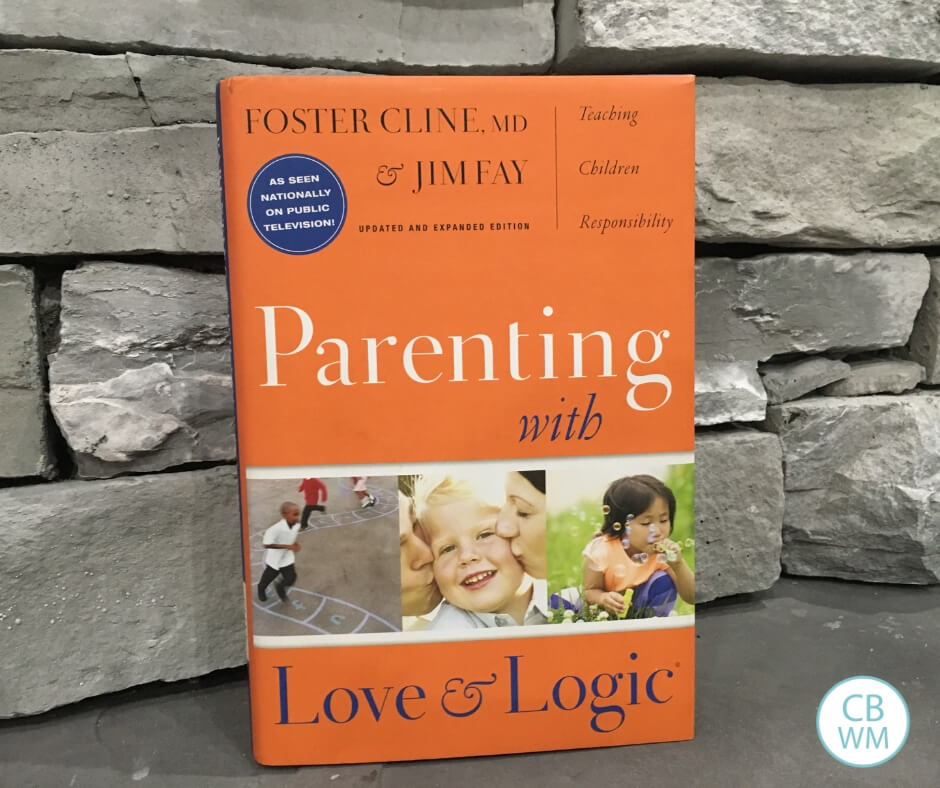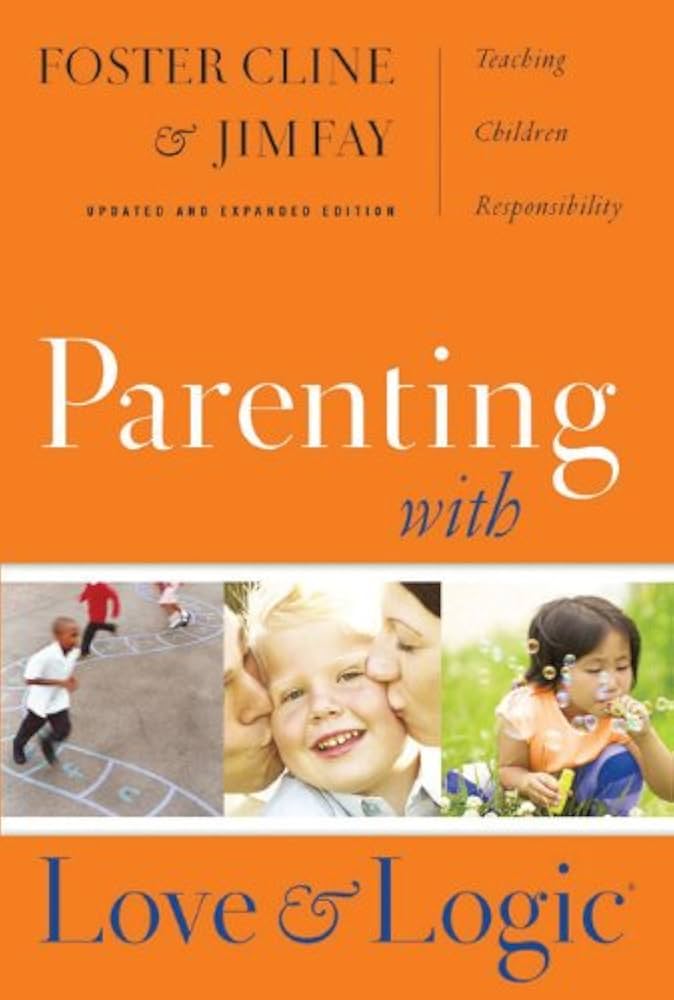Parenting can be a challenge for many. Finding the right approach is key.
“Parenting With Love And Logic” offers a balanced method, blending care with discipline. This approach helps parents raise responsible, well-behaved kids. It emphasizes mutual respect and logical consequences. Love and logic combine to create a nurturing environment. Parents can guide their children through life’s ups and downs.
They learn to make choices and understand consequences. This method teaches kids accountability. It also fosters strong bonds between parents and children. By setting clear boundaries, children feel secure. They learn valuable life skills while feeling loved. This introduction will explore the principles of “Parenting With Love And Logic. ” It will show how this method can make a positive impact on family life.

Introduction To Parenting With Love And Logic
Parenting with Love and Logic is a unique approach to raising children. It combines empathy with responsibility. This method helps parents guide their children with love. It also encourages logical thinking.
Philosophy And Principles
The Love and Logic philosophy is simple. Parents show love through empathy and understanding. They also teach responsibility through logical consequences.
Here are the core principles:
- Empathy: Show understanding and compassion to your child.
- Choices: Give children options to promote decision-making skills.
- Consequences: Use logical consequences to teach responsibility.
- Consistency: Be consistent with rules and expectations.
Benefits For Children
Children benefit greatly from this parenting style. Here are some key advantages:
| Benefit | Description |
|---|---|
| Better Decision-Making | Children learn to make smart choices. |
| Increased Responsibility | Logical consequences teach accountability. |
| Emotional Growth | Empathy helps children understand their feelings. |
| Stronger Relationships | Love and empathy build trust between parent and child. |
These benefits help children grow into well-rounded adults. They learn to navigate life with confidence.
Creating A Loving Environment
Creating a loving environment is essential for effective parenting with love and logic. This approach ensures that children feel safe, valued, and understood. A nurturing atmosphere fosters positive development and strengthens the parent-child bond. Let’s explore the key elements of creating such an environment.
Emotional Support
Providing emotional support helps children feel secure and loved. Listen actively to their concerns and validate their feelings. This builds trust and encourages open communication. Use gentle words and maintain a calm tone during conversations.
- Show empathy and understanding.
- Encourage them to express their emotions.
- Offer comforting gestures like hugs or pats on the back.
Positive Reinforcement
Positive reinforcement motivates children to continue good behavior. Praise their efforts and achievements to boost their confidence. Use rewards like stickers or extra playtime as incentives.
- Acknowledge their accomplishments with specific compliments.
- Set clear, achievable goals and reward progress.
- Celebrate milestones together as a family.
| Method | Example |
|---|---|
| Verbal Praise | “Great job on your homework!” |
| Small Rewards | Extra 15 minutes of screen time |
| Celebration | Family movie night |
These strategies help build a positive and loving environment, essential for effective parenting with love and logic.
Setting Boundaries
Setting boundaries is crucial in Parenting With Love And Logic. It helps children understand limits and build self-discipline. Clear boundaries create a safe environment and teach respect and responsibility.
Establishing Rules
Creating rules is the first step in setting boundaries. Rules should be simple, clear, and age-appropriate. Involve your children in the rule-making process. This makes them feel valued and respected.
Here is a simple table to help you establish effective rules:
| Aspect | Example |
|---|---|
| Language | Use kind words |
| Bedtime | Lights off by 8 PM |
| Screen Time | 30 minutes after homework |
Consistent Consequences
Consistency is key to effective discipline. Children need to know that actions have consequences. Ensure the consequences match the behavior. Avoid harsh punishments. Use consequences that teach valuable lessons.
Here are some tips for maintaining consistency:
- Be calm and firm when enforcing rules.
- Explain the consequences beforehand.
- Follow through with the consequences every time.
Setting boundaries with love and logic helps children grow into responsible adults. It creates a loving, respectful, and structured home environment.
Encouraging Independence
Encouraging independence in children is crucial for their growth. It helps them become confident, responsible, and capable adults. Parenting with Love and Logic focuses on fostering this independence. It guides parents to support their children in making choices and solving problems. This approach allows kids to learn from their own experiences.
Decision-making Skills
Children need to practice making decisions. Start with small choices. Let them pick their clothes or choose a snack. This builds their confidence. As they grow, offer bigger decisions. Give them options and let them decide. Support their choices and discuss the outcomes. This helps them understand the effects of their decisions.
Problem-solving Techniques
Teach children how to solve problems. Encourage them to think of solutions. Ask questions like, “What do you think we should do?” Guide them through the process. Let them try their ideas. If they fail, discuss what went wrong. Offer support but don’t solve the problem for them. This helps them learn critical thinking and resilience.
Managing Misbehavior
Misbehavior in children is a common challenge for parents. Addressing it effectively requires a balance of love and logic. The key lies in guiding children towards understanding the consequences of their actions and fostering empathy.
Natural Consequences
One of the most effective ways to manage misbehavior is through natural consequences. These are the outcomes that happen naturally as a result of a child’s actions. For example, if a child refuses to wear a coat on a cold day, they feel cold. This teaches them the importance of dressing appropriately.
Natural consequences help children learn from their mistakes without constant parental intervention. They see the direct result of their actions and understand the need to make better choices in the future. This method encourages independence and responsibility.
Empathy And Understanding
Showing empathy and understanding is crucial in managing misbehavior. When a child misbehaves, acknowledging their feelings can help. Saying, “I see you’re upset,” lets them know their emotions are valid. This approach builds trust and opens the door for constructive conversations.
Using empathy involves active listening and responding with kindness. It’s important to avoid harsh judgments and instead focus on guiding the child towards better behavior. This method strengthens the parent-child relationship and promotes emotional intelligence in children.

Building Emotional Resilience
Parenting with love and logic involves nurturing emotional strength in children. Emotional resilience helps them handle life’s challenges. It builds their confidence and problem-solving skills.
Teaching kids to manage emotions positively is essential. This approach fosters a supportive environment for growth.
Coping Strategies
Children need tools to face difficulties. Simple coping strategies can help. Encourage them to talk about their feelings. Listening without judgment is crucial. Suggest writing or drawing as outlets.
Introduce deep breathing exercises. These calm the mind. Teach them to count to ten when upset. This simple act can prevent impulsive reactions.
Stress Management
Stress is part of life. Helping kids manage it is vital. Regular routines offer stability. Consistent sleep schedules and meal times support well-being.
Physical activity reduces stress. Encourage outdoor play and sports. Teach them relaxation techniques. Guided imagery or progressive muscle relaxation can help.
Always be a role model. Demonstrate healthy stress management in your own life.
Effective Communication
Effective communication is the cornerstone of successful parenting with love and logic. It builds trust and understanding between parents and children. Clear communication helps to navigate daily challenges and strengthens family bonds. Below, we delve into two crucial aspects of effective communication: Active Listening and Expressing Feelings.
Active Listening
Active listening involves truly hearing what your child is saying. It’s more than just nodding. It’s about engaging and understanding their words and feelings.
- Make Eye Contact: Look at your child while they speak. This shows you care about their words.
- Avoid Interrupting: Let them finish their thoughts. This encourages them to share more.
- Reflect Back: Repeat what they’ve said in your own words. This shows you’ve understood.
- Ask Open-Ended Questions: Encourage them to explain further. This deepens the conversation.
Expressing Feelings
Expressing feelings is vital for emotional connection. It teaches children to understand and articulate their emotions.
- Be Honest: Share your feelings with your child. This sets an example for them.
- Use “I” Statements: Say “I feel” instead of “You make me feel”. This avoids blaming.
- Encourage Sharing: Ask your child how they feel. This helps them open up.
- Validate Emotions: Acknowledge their feelings. This shows their emotions are important.

Parental Self-care
Parenting with love and logic requires a balance of empathy and discipline. But without taking care of yourself, it’s hard to stay consistent. Self-care is not selfish. It ensures you have the energy and patience needed for effective parenting. Let’s explore some practical tips for reducing stress and maintaining balance.
Stress Reduction
Stress can cloud your judgment and affect your interactions with your child. Take deep breaths. Deep breathing can calm your mind. Exercise regularly. Physical activity releases endorphins that help reduce stress.
Set aside time for hobbies. Engaging in activities you enjoy can rejuvenate you. Don’t hesitate to ask for help. Sharing responsibilities can significantly reduce stress levels.
Maintaining Balance
A balanced life helps you manage parental duties better. Create a daily routine. A structured schedule can make your day more predictable and less stressful. Prioritize your tasks. Focus on what truly matters and let go of minor details.
Ensure you get enough sleep. Lack of sleep can lead to irritability and poor decision-making. Spend quality time with your partner. A strong relationship provides emotional support, making the parenting journey easier.
Frequently Asked Questions
What Is Love And Logic Parenting?
Love and Logic parenting is a philosophy that combines empathy with logical consequences. It teaches children to be responsible and make good choices.
How Does Love And Logic Work?
Love and Logic works by setting clear boundaries and consequences. Parents use empathy to help children understand and learn from their mistakes.
What Are The Benefits Of Love And Logic?
The benefits include improved behavior, better decision-making skills, and stronger parent-child relationships. It encourages independence and responsibility.
Can Love And Logic Be Used For All Ages?
Yes, Love and Logic can be adapted for children of all ages. It provides strategies that grow with your child.
Conclusion
Parenting with love and logic creates confident and happy children. This approach builds strong relationships. It teaches responsibility and problem-solving skills. Your child learns to make good choices. Parents feel more at ease and connected. Simple techniques lead to big changes.
Try it and see the positive effects in your family. Focus on love, set limits, and watch your child grow. Enjoy the journey of parenting with love and logic.

